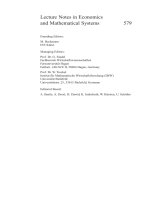Lecture Issues in economics today - Chapter 38
Bạn đang xem bản rút gọn của tài liệu. Xem và tải ngay bản đầy đủ của tài liệu tại đây (228.98 KB, 13 trang )
Chapter 38
Antitrust
McGrawHill/Irwin
© 2002 The McGrawHill Companies, Inc., All Rights Reserved.
Chapter Outline
• WHAT’S WRONG WITH MONOPOLY
• NATURAL MONOPOLY AND
NECESSARY MONOPOLY
• MONOPOLIES AND THE LAW
• EXAMPLES OF ANTITRUST ACTION
McGrawHill/Irwin
© 2002 The McGrawHill Companies, Inc., All Rights Reserved.
Monopolies in Everyday Life
• Most people have only one provider of
local telephone service, natural gas,
electricity and cable television. These
monopolies are not illegal.
• Other monopolies are prevented from
forming, or prevented from exerting
their power to get other business
because that threatens consumer
welfare.
McGrawHill/Irwin
© 2002 The McGrawHill Companies, Inc., All Rights Reserved.
What’s Wrong With Monopoly
P
A
SPC=MCMonop
B
Pmonop
C
PPC
E
MR
D
F
Qmonop QPC
Q
Deadweight Loss from Monopoly = EBC
McGrawHill/Irwin
© 2002 The McGrawHill Companies, Inc., All Rights Reserved.
Reduced Innovation with
Monopoly
• A monopolist earns economic profit and
there is no mechanism for that
economic profit to be diminished.
• Because a monopolist need not
innovate to survive, monopolies also
tend not to innovate.
McGrawHill/Irwin
© 2002 The McGrawHill Companies, Inc., All Rights Reserved.
Necessary Monopolies
• Natural Monopolies
– A natural monopoly typically results from
substantial barriers to entry (a legal or
economic mechanism that prevents firms
from competing in an industry)
– This often happens in the utility industry
where fixed costs are very high,
McGrawHill/Irwin
© 2002 The McGrawHill Companies, Inc., All Rights Reserved.
Modeling a Natural Monopoly
P
Pmonopoly
D
Pregulated
MR
Qmonopoly
McGrawHill/Irwin
Qregulated
ATC
MCMonopoly
Q
© 2002 The McGrawHill Companies, Inc., All Rights Reserved.
Other Necessary Monopolies:
Patents and Copyrights
• Patents and Copyrights protect the
creators of inventions, books, music,
etc. so that they are motivated to
produce. Without that protection their
work’s economic value could be taken.
McGrawHill/Irwin
© 2002 The McGrawHill Companies, Inc., All Rights Reserved.
Anti-Trust Law
• The Sherman Anti-Trust Act
– This law and other antitrust legislation that
followed it makes it illegal to
• use the monopoly power in one market to gain
market power in another market. (e.g. a local
telephone company cannot require use of their
cellular system.)
• become a monopoly by merging with a
competitor (without government approval.)
McGrawHill/Irwin
© 2002 The McGrawHill Companies, Inc., All Rights Reserved.
What Constitutes a Monopoly
• How many competitors are necessary for a
market to be described as competitive?
– There are many airlines but at most airports there
is a dominant airline.
– Microsoft has competition from Apple and Linux
for operating systems and from WordPerfect for
office suites but dominates these industries.
• The Contestable Markets Hypothesis
– one firm is all that is necessary for competitive
prices to exist as long as that firm is threatened by
hit-and-run entry
McGrawHill/Irwin
© 2002 The McGrawHill Companies, Inc., All Rights Reserved.
Examples of Antitrust Action:
Standard Oil
• The company owned all stages of production
from crude oil drilling to retail outlets.
• The company used its monopoly in one area
(refining and distribution) to force its way into
the retail market.
• Much of the Sherman Act makes illegal what
Standard Oil did.
• The company was broken into several
regional oil companies.
McGrawHill/Irwin
© 2002 The McGrawHill Companies, Inc., All Rights Reserved.
Examples of Antitrust Action:
IBM
• The company was the dominant firm in
mainframe computers.
• The company was accused of using
that power to dominate other industries
– mainframe software
– personal computers.
• The suit was ultimately dropped.
McGrawHill/Irwin
© 2002 The McGrawHill Companies, Inc., All Rights Reserved.
Examples of Antitrust Action:
Microsoft
• Microsoft dominated the operating system
business.
• It was shown in court that it used their
monopoly in the operating system business to
generate market power in office suites and
internet navigation.
• The remedy offered by the trial court was that
the company be broken into two parts.
• The Appeals Court overturned the remedy
and the case was settled.
McGrawHill/Irwin
© 2002 The McGrawHill Companies, Inc., All Rights Reserved.









